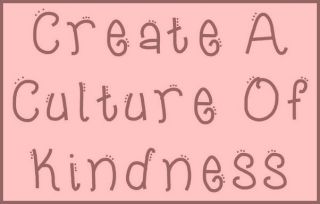By Dr. Marilyn Price-Mitchell
Most parents and teachers want children to be happy.
To that end, parents find themselves doing things for kids to make them happy, like buying gifts, taking them for ice cream, playing games together, or helping with homework.
Teachers are constantly doing for children too. In addition to understanding the link between knowledge and happiness, teachers often buy supplies from their own paychecks, bring treats to class, plan fun excursions, and support students in otherimmeasurable and enduring ways.
Do acts of kindness toward children make us happier parents and teachers? Of course they do.
In fact, studies consistently show that we feel happier when we perform acts of kindness – for our children, students, families, friends, and communities. Not only do good deeds make us feel better, but as David Brooks explained in the New York Times article Nice Guys Finish First, people who are kind and compassionate are usually the most successful.
The Kindness Dilemma – Receiving vs. Giving
Unfortunately, we don’t make children happy by simply enabling them to be receivers of kindness. We increase their feelings of happiness and well-being, reduce bullying, and improve their friendships by teaching them to be givers of kindness.
The truth is that children are born to be altruistic givers. But somewhere between birth and 4th grade, they are socialized to think more about themselves than others. (Yes, we all play a role in how this occurs.)
How do we change this trajectory and improve children’s well-being?
A recent study, Kindness Counts, conducted by researchers from the University of British Columbia and the University of California, Riverside, broke new ground by showing the benefits derived by tweens when they were taught happiness-increasing strategies.
For a month, several hundred 9-11 year-olds performed and recorded three acts of kindness each week for anyone they wished. Another several hundred kept track of three pleasant places they visited during the week.
Not surprisingly, the results were consistent with adult studies. When kids performed acts of kindness or took notice of the pleasant places they visited during the week, they significantly increased feelings of happiness and satisfaction.
But those who performed acts of kindness received an additional benefit. Measuring how well children were liked or accepted by their peers, the study showed those who performed acts of kindness gained an average of 1.5 friends during the four-week period – good support for the idea that “nice guys finish first.”
Like many others, this study demonstrated that being kind to other people benefits the giver. For children, it earns them increased well-being and also popularity and acceptance among peers.
Threads of kindness are interwoven with many other positive behaviors and benefits for youth. Well-liked tweens exhibit more positive, less bullying behaviors when they become teens. Happier children are more likely to have higher academic achievement. And the list goes on.
Four Steps to Create a Culture of Kindness

It’s easy to apply the Kindness Countsstudy and achieve similar results at home or in the classroom. The goal is to help kids become more mindful about doing acts of kindness and aware of feelings ofgratitude when they experience pleasant activities.
Follow these four steps to increase happiness for children – and all of us!
Educate Yourself
Learn about the importance of kindness and its benefits for children and adults. The Random Acts of Kindness Foundation website is a great place to begin. You’ll find classroom and home activities for all ages of children.
What strategies do you use with your children or students to increase acts of kindness and teach gratitude?
Author
Marilyn Price-Mitchell, PhD, is the author of Tomorrow’s Change Makers: Reclaiming the Power of Citizenship for a New Generation. A developmental psychologist and researcher, she works at the intersection of positive youth development and education.
Source: Psychology Today
https://www.psychologytoday.com/blog/the-moment-youth/201301/acts-kindness-key-happiness-children-teens







